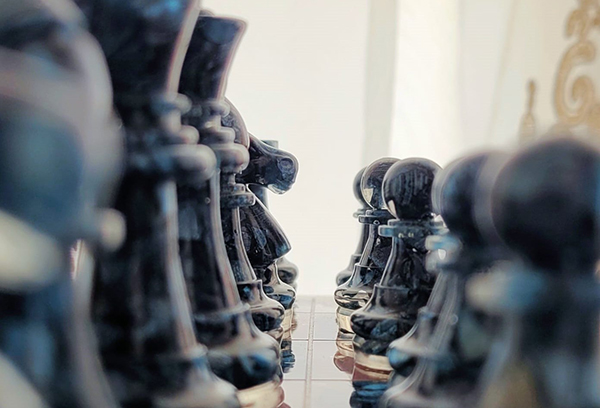By Oula Mahfouz
The interest in the origins of the game began with a conversation over a game of chess in the family. “Checkmate, Omar. Do you know that the origin of chess is Arabic, because ‘checkmate’ is Arabic and means ‘the king has died’.” “No, mum, chess comes from India,” the nine-year-old replied. His twelve-year-old brother Mohammad intervened in the discussion and said, “No, you’re both wrong, the game comes from Persia.” The two boys seemed very sure of their opinion.
When I looked for the origin of the game, I discovered that there are very different explanations and many legends about the origin of the game. There is probably no real answer to the question, because the game of chess contains elements from different cultures, times and languages. Of the stories that are told about the origin of chess, I have chosen the best known, but they are of course very different.
Very common is the tradition that the game originated in India in the 6th century AD and was known as Chaturanga. It tells that a wise man wanted to explain to the tyrannical Indian king the importance of the people in his kingdom. So he invented the game, which consists of the king, the queen (in Arabic and other languages: minister), jumpers (horses), bishops (elephants) and pawns (soldiers). During the game, he could explain to the king the duties of his subjects and make it clear to him that they were protecting the kingdom.
According to a second version, the game originated in China in the 2nd century BC. There is a theory that the game of chess descended from the Chinese game Xiangqi or from one of its predecessors, which include the Indian Chaturanga, the Japanese Shogi, and the Korean Janggi.
The third tradition says that chess originated in Persia, today’s Iran: during the reign of the Sassanids, it is said to have been invented by a servant of a shah—a king—around the year 600 AD.
The Arabs learned about the game when they conquered Persia. The game was very popular in the Islamic world, it became the favourite game of the caliphs and several books were written about it. The Muslims eventually brought the game to Europe via Spain.
But what do the different names for the game mean?
Chaturanga: The Indian word means “four elements” or “four parts”. This term was used to describe the Indian army, which consisted of the fighting chariots, the horsemen, the elephants and the foot soldiers.
Chatrang: The Persian word is either taken from the Indian word chaturanga or it comes from the Persian word for mandrake, a plant with a root that resembles a human figure.
Shatrandsch: When the Arabs conquered the Persian Empire in the 7th century, they also learned about the game of chess. However, they changed the name of the game because some sounds did not exist in their language.
Chess: The German name derives from the Persian word Schah (king) and, despite its phonetic similarity, has nothing to do with Chaturanga or Shatrang.
So the children were right: the Arabs did not invent chess, but they did bring the game to Europe.
tun22112204
www.tuenews.de
Schachfiguren. Foto: tünews INTERNATIONAL / Oula Mahfouz.
001823




